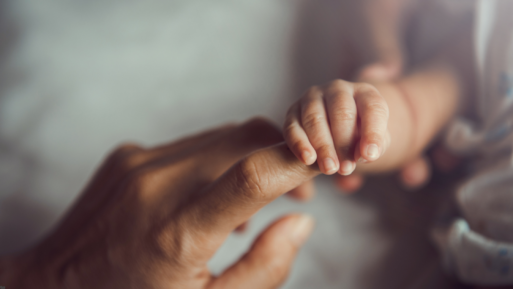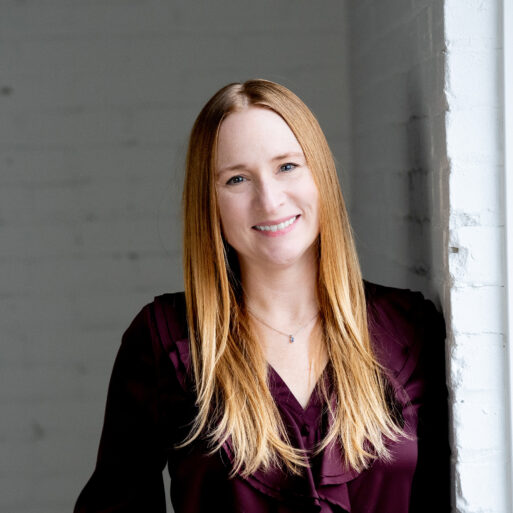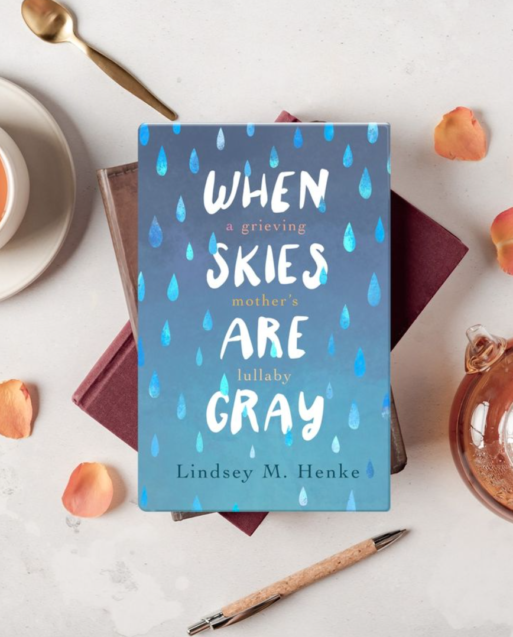 Lindsey Henke, a licensed clinical social worker, specializes in treating women and families who have experienced perinatal loss. Her practice deals with many different causes of infant loss: she treats parents who had to terminate their pregnancy for medical reasons, people who have suffered a stillbirth, SIDS, or infants with medically complex health conditions, as well as those who struggle with infertility and the losses experienced in those procedures. She felt called to this specialty because she lost a stillborn daughter, Nora, in 2012.
Lindsey Henke, a licensed clinical social worker, specializes in treating women and families who have experienced perinatal loss. Her practice deals with many different causes of infant loss: she treats parents who had to terminate their pregnancy for medical reasons, people who have suffered a stillbirth, SIDS, or infants with medically complex health conditions, as well as those who struggle with infertility and the losses experienced in those procedures. She felt called to this specialty because she lost a stillborn daughter, Nora, in 2012.
After Nora’s death, Henke turned to the therapeutic techniques that she had already been teaching others, in an effort to assuage her overwhelming grief. She began journaling her thoughts and created the blog Stillborn and Still Breathing, a website dedicated to sharing her story and providing a space for other grieving mothers. She also founded Pregnancy After Loss Support (PALS), an online magazine and provider of peer-to-peer support services for moms trying to conceive, and those who were pregnant or parenting their subsequent baby in the first year after a previous loss. Most recently, Henke also wrote her memoir, When Skies are Gray: A Grieving Mother’s Lullaby.
October is Pregnancy and Infant Loss Awareness Month, a time to share stories like Henke’s, promote understanding, and offer support to families who have experienced the loss of a baby.

Lindsey Henke, MSW, LICSW
Editor’s Note: This interview has been edited for length and clarity.
Tell us a little bit about Nora, your story, and how your experience led you down this path.
I was working as a therapist with women who had severe and persistent mental illness and trauma at a women’s trauma center in Minneapolis. I was pregnant with Nora, and after a perfect pregnancy we went into labor one night, and found out that she had passed away. She was stillborn. So that was in 2012.
While I was grieving Nora, I turned to writing to heal, and that was really helpful. I was able to really immerse myself into my grief, and use the writing as a therapeutic tool. That’s what led me to want to transition into this work that I’ve been doing now for over 10 years, because then we got pregnant again, with my daughter Zoe. Fifteen months after Nora died we had Zoe. I wrote about my pregnancy with her for a pregnancy and newborn magazine, and people started noticing my writing. And that’s how PALS [Pregnancy After Loss Support] got started. It’s an online peer-to-peer support magazine, and we offer services like support groups, in-person peer meetups, online groups, forums and educational outreach to healthcare providers on how to support the emotional needs of parents who are pregnant after a perinatal loss.
So PALS came out of my experience when Zoe was three months old. And then, in my private practice, I see a lot of parents who have experienced loss as well. I see them through that grief, and the loss of their identity as parents to that baby, of missing that baby, and then often through the subsequent pregnancy.
How would you say things have changed since you started PALS?
When I lost Nora 12 years ago, losing a baby wasn’t talked about as much online as it is now. But over the last 10 years or so it has become a more acceptable thing. When I first wrote for Still Standing magazine, when I started my writing journey, people gravitated towards it because there was still such a stigma and a silence behind this kind of grief. But the internet helped people talk about it more. In the last 12 years, I’ve seen the conversation and the acceptance around it explode. Because we’re willing to have more conversations online, because people share pictures of their babies that were stillborn or died too soon, because people can share their experience and it lets other people share. I’ve felt like we became more able, as a society, to talk about it. For example, Chrissy Teigen shared her loss, and Megan Merkel shared her story, and those stories make the news now. They’re incorporated into the collective conversation, which they wouldn’t have been even 12 years ago. So that’s a big shift in the direction that we need to go in. I think that by sharing your story, you give other people permission to share their story, and it’s a snowball effect.

Why is it so important that parents share their stories?
It’s a journey you want to tread lightly, depending on your community and the people you know. But the only way we get to parent our babies that have died is by continuing to have that conversation about them, and continuing to hold space for them and finding other communities that do so is what we call the continued bonds of attachment.
The continued bonds of attachment theory is the idea that we don’t find closure for grief, we continue that relationship. So when we’re sharing about our dead children and how we miss them, that’s us continuing that relationship with them. I do think you have to find a community or space when you feel that that’s going to be received appropriately. It’s different, because Brené Brown talks about your shame story, right – and there’s no shame in losing a child – but she also notes that not everybody is deserving of your story. Not everybody deserves to see your vulnerability.
And I often say the same thing over and over again, even with my clients: I think what we’re missing in society is we don’t want to talk about death. We’re a death-denying society; we idolize youth, and death has been swept away to funeral homes and hospitals. So we have this fear of death, and that’s invalidating. That’s invalidating to grieving people’s lived experiences. It’s not just the people we’re missing, the children we’re missing, but it’s also the experience of getting to parent in the way we had hoped to.
How can people best support a loved one who has experienced pregnancy loss or the loss of a child?
I think a lot of it’s about learning how to be comfortable with your own vulnerability so you can be comfortable with others’. You can’t fix it, right? So, we usually recommend that you reach out to them, offer them a meal, or send a card, or do something supportive right after the initial loss and the death, but then continue to reach out to them. Remember that this is a one-time event; when they come home from the hospital and the baby isn’t with them, or if they have a funeral after that, their grief doesn’t end. It continues, and checking in with them continually can be helpful.
It really helps to be mindful of how you might reach out to them. Like, be clear with your intentions, maybe say that you’re inviting them somewhere because they’re your friend, but that you don’t expect them to come if it’s too difficult. Be considerate; you can even ask them if they even want an invite. Test the waters gently, and just say, “Hey, I miss you. I understand you’re going through a hard time. How can we connect again? Do you want to hang out? Are you in that space yet? Do you think you could come to a gathering where other babies are, or will that be too hard right now?” Have open conversations, but give them permission to say, “no.” And maybe in that conversation, you could say,”Don’t come just to please me. What I’m really asking is: are you capable of coming? Is that what’s best for you right now? I just want you to know that I miss you, and I’m thinking about you, and I want to see you again.”
But expect that they’ll be different. Understand that they’re not the person they used to be. A lot of times what happens is after six months or so people will tell my clients that they’re not who they used to be. Well, no, they’re not going to be. Have patience with them, they will find that part of themselves again, but they need space and nurturing to do so.
Also, be mindful of using their baby’s name, if they named the baby. It’s really important to use their name, because when we do, we make space for the baby that died, we validate their existence. And in turn, we validate the parents’ parenthood, and their grief.
I think that’s what we need the most, that validation. After Nora died, I had a very supportive community that understood that my grief wasn’t temporary. I needed time and space, and to have other people recognize that my baby was just as real as anyone else’s child. When you have a baby, you experience a massive identity shift, and you’ll want people to recognize that you underwent that shift, too. But suddenly, that identity is shifted again into a bereaved or grieving parent – and that’s not an identity we ever want, but it is the identity we have. So now you’re also grieving the loss of that vision of parenthood, too.
Is there anything else you would like our readers to know?
That grief and joy can coexist, and that the juxtaposition can be beautiful. There is life after loss, and you have to feel your feelings in order for you to get there. We push the idea of suffering away because we haven’t been taught how to hold it, so we’re afraid of grief and death and dying and illness. But they’re a part of life. So if we can figure out a way to support people’s suffering, we can collectively be better humans.
Twelve years after I lost Nora, I am happy. I miss her so much, and I wonder who she would be, but that is my life. I’m able to hold that grief, and feel it, but it doesn’t have to be overwhelming.

 Validate Their Parenthood: How to Support a Mother After Perinatal Loss
Validate Their Parenthood: How to Support a Mother After Perinatal Loss


 “Hand to Earth” by Andy Goldsworthy
“Hand to Earth” by Andy Goldsworthy
 Trans Remembrance Project Provides a Community of Grieving
Trans Remembrance Project Provides a Community of Grieving
 Caring for a Dying Loved One? Be Gentle With Yourself.
Caring for a Dying Loved One? Be Gentle With Yourself.














